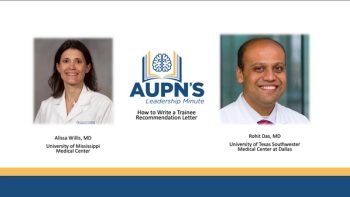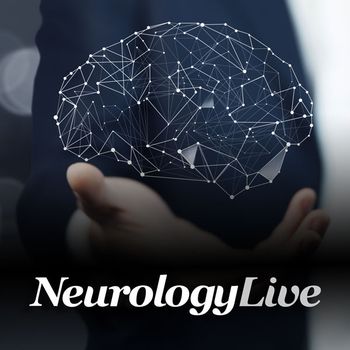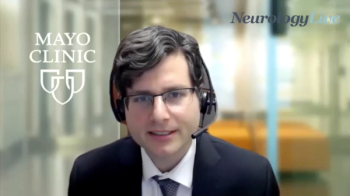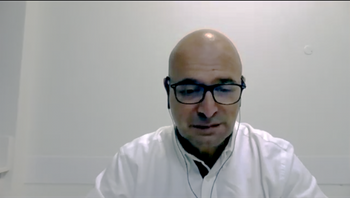
In the third year of treatment, both dose cohorts did not experience any contrast-enhancing lesions, and only a small population in the Barcelona center showed new T2 lesions.

In the third year of treatment, both dose cohorts did not experience any contrast-enhancing lesions, and only a small population in the Barcelona center showed new T2 lesions.

Notably, no patients received a dose and route consistent with national guidelines.

The medical director manager of neuroscience at Genentech discussed the swath of data presented on the humanized anti-CD20 monoclonal antibody at MS Virtual.

Early intensive treatment was more effective in controlling disability progression over time compared with an escalation therapy approach.

The director of the UCSF Weill Institute for Neuroscience spoke to the advantages of having agents that can be used across the spectrum of MS, and the role disease progression plays early on.

Episode 1 of the AUPN Leadership Minute features Alissa Willis, MD, of University of Mississippi Medical Center; and Rohit Das, MD, of University of Texas Southwestern Medical Center at Dallas. [WATCH TIME: 3 minutes]

Patients with lower levels of disability tended to report fatigue as the most impactful symptom in daily life.

The professor of neurology and pediatrics at University of Alabama at Birmingham Epilepsy Center discussed the FDA approval of epidiolex for patients with tuberous sclerosis complex.

The results support continued development in Alzheimer disease and in patients with mid-stage Huntington disease who suffer from greater cognitive deficits.

The positive top-line data from Study 3 revealed that children with Dravet syndrome experienced more than a 60% greater reduction in mean monthly convulsive seizures compared to placebo.

Treatment with ocrelizumab can improve freedom from individual events in patients with relapsing-remitting multiple sclerosis regardless of suboptimal DMT response in the past.

The director of the VA Southwest Parkinson’s Disease Research, Education, and Clinical Centers spoke to the importance of patient-focused interventions in PD.

The director of the UCSF Weill Institute for Neuroscience offered his perspective on data presented at MS Virtual suggesting ofatumumab’s benefit in patients with MS who were treatment naïve.

Atara Biotherapeutics’ allogeneic EBV-targeted T-cell therapy, ATA188, is well-tolerated in phase 1, with a dose identified for the randomized placebo-controlled portion of the study.

Future research may help better characterize whether fatigue interventions aimed at one patient population may be effective in the other.

In honor of World Alzheimer’s Day, NeurologyLive is sharing some of the latest clinical developments and thoughts from leaders in the field.

The neurologist at Mayo Clinic shares his thoughts on the state of Alzheimer disease awareness and what can be done to lower dementia rates.

Marinus Pharmaceuticals’ positive allosteric GABAA receptor modulator ganaxolone was associated with significant median reductions in 28-day major motor seizure frequency compared to placebo.

A pair of datasets from the phase 3b CASTING study of ocrelizumab (Ocrevus; Genentech) suggest that patients treated with the agent experienced high rates of no evidence of disease activity status regardless of prior DMT exposure.

Neurology News Network for the week ending September 19, 2020.

Take 5 minutes to catch up on NeurologyLive's highlights from the week ending September 18, 2020.

The global head of Development and External Affairs-Neuroscience at Janssen Pharmaceutical discussed the results of a phase 2 core and extension study of ponesimod in patients with relapsing-remitting multiple sclerosis.

The ongoing fight to add to the epidemiologic understanding of migraine is explored in part 2 of this special 3-part multimedia series on the evolution of migraine care.

The director of the VA Southwest Parkinson’s Disease Research, Education, and Clinical Centers explained how social prescribing can play a key role in the prevention of social isolation.

Along with being generally well tolerated, ozanimod was able to help most patients become relapse free without disability progression.

The results point to the potential for sumifilam to become a transformative treatment for patients with Alzheimer disease.

The director of the Movement Disorders Program and Vance Lanier Chair of Neurology at Emory University School of Medicine gave his perspective on the interim findings of a long-term safety study of apomorphine sublingual film.

The director of the VA Southwest Parkinson’s Disease Research, Education, and Clinical Centers offered background the inspiration for the study and why loneliness should be addressed in these patients.

Two posters presented at MS 2020 confirm satralizumab’s ability to reduce protocol-defined relapse including in patients with treatment-naïve NMOSD.

The head of the Laboratory of Clinical Pharmacology and Therapeutics at the University of Lisbon gave his perspective on the importance of the study population of this analysis.